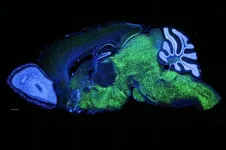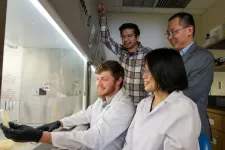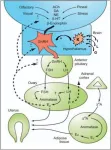What makes us remember our dreams?
The ability seems to be based both on individual characteristics and external factors: a new study by researchers at the IMT School for Advanced Studies sheds light on the various factors that influence dream recall
2025-02-18
(Press-News.org)
Some people wake up vividly recalling their dreams from the night, and can tell precise stories experienced during the night, while others struggle to remember even a single detail. Why does this happen? A new study, conducted by researchers at the IMT School for Advanced Studies Lucca, and published on Communications Psychology explores the factors that influence so called "dream recall"— the ability to remember dreams upon awakening—and uncovers which individual traits and sleep patterns shape this phenomenon.
The reason why there is such a difference in recalling dreams remains a mystery. Some studies found that women, young persons, or people with a tendency to daydreaming tend to better recall night dreams. But other studies did not confirm these findings. And other hypotheses, such as that personality traits or cognitive abilities count, received even less support from data. During the recent COVID pandemic, the phenomenon of the individual differences in morning dream recall attracted renewed public and scientific attention when an abrupt surge in morning dream recall was reported worldwide.
The new research, carried out in collaboration with the University of Camerino, was conducted in the years from 2020 to 2024, and involved over 200 participants, aged 18 to 70, who recorded their dreams daily for 15 days while their sleep and cognitive data were tracked using wearable devices and psychometric tests. Each study participant was given a voice recorder to report, every day right after the awakening, about the experiences they had during sleep. Participants had to report whether they remembered having dreamed or not, if they had the impression of having dreamed but did not remember anything about the experience, and to describe the content of the dream if they were able to remember it. For the duration of the study, participants also wore an actigraph, a sleep monitoring wristwatch that detects sleep duration, efficiency, and disturbances. At the beginning and end of the dream recording period, participants were subjected to psychological tests and questionnaires that measure various factors, from anxiety levels to interest in dreams, proneness to mind-wandering (the tendency to frequently shift attention away from the task at hand toward unrelated thoughts, or internal reflections), up to memory and selective attention tests.
Dream recall, defined as the probability of waking up in the morning with impressions and memories from a dream experience, showed considerable variability between individuals and was influenced by multiple factors. The study revealed that people with a positive attitude toward dreams and a tendency for mind-wandering were significantly more likely to recall their dreams. Sleep patterns also seemed to play a critical role: individuals who experienced longer periods of light sleep had a greater likelihood of waking with a memory of their dreams. Younger participants showed higher rates of dream recall, while older individuals often experienced "white dreams" (a sensation of having dreamt without recalling any details). This suggests age-related changes in memory processes during sleep. Moreover, seasonal variations emerged, with participants reporting lower dream recall during winter compared to spring, hinting at the potential influence of environmental or circadian factors.
“Our findings suggest that dream recall is not just a matter of chance but a reflection of how personal attitudes, cognitive traits, and sleep dynamics interact,” explains lead author Giulio Bernardi, professor in general psychology at the IMT School. “These insights not only deepen our understanding of the mechanisms behind dreaming but also have implications for exploring dreams' role in mental health and in the study of human consciousness.”
“Data collected within this project will serve as a reference for future comparisons with clinical populations,” adds Valentina Elce, researcher at the IMT School and first author of the study. “This will allow us to move forward the research on the pathological alterations of dreaming and their potential prognostic and diagnostic value”.
END
ELSE PRESS RELEASES FROM THIS DATE:
2025-02-18
The immune systems of cancer patients are highly disrupted, with those who have a higher number of immune cells in their blood having a better survival rate, finds a new study that uses a pioneering technique developed by researchers at UCL and the Francis Crick Institute.
The tool, described in Nature Genetics, is called Immune Lymphocyte Estimation from Nucleotide Sequencing (ImmuneLENS). It enables researchers to calculate the proportion of T cells and B cells (types of immune cell) from whole genome sequencing (WGS) data for the first time.
Whole genome sequencing (WGS) uses a blood sample to create a complete ...
2025-02-18
*** Embargoed for release until Tuesday, Feb. 18, 2025, at 5 a.m. EST ***
A newly identified part of a brain circuit mixes sensory information, memories, and emotions to tell whether things are familiar or new, and important or just “background noise.”
Led by researchers from NYU Langone Health, the work found that a circuit known to carry messages from a brain region that processes sensory information, the entorhinal cortex (EC), to the memory processing center in the hippocampus (HC) has a previously unrecognized pathway that carries messages directly back to the EC.
Publishing online Feb. 18 in Nature Neuroscience, the study results show that this direct feedback ...
2025-02-18
The origins of human language remain mysterious. Are we the only animals truly capable of complex speech? Are Homo sapiens the only hominids who could give detailed directions to a far-off freshwater source or describe the nuanced purples and reds of a dramatic sunset?
Close relatives of ours such as the Neanderthals likely had anatomical features in the throat and ears that could have enabled the speaking and hearing of spoken language, and they share with us a variant of a gene linked to the ability to speak. And yet it is only in modern humans that we find expanded brain regions that are critical for language production and comprehension.
Now researchers from The Rockefeller University ...
2025-02-18
SEATTLE – Scientists have developed a breakthrough method to track diet using stool metagenomic data.
Developed by researchers at the Institute for Systems Biology (ISB), the new method, called MEDI (Metagenomic Estimation of Dietary Intake), detects food-derived DNA in stool samples to estimate dietary intake. MEDI leverages stool metagenomics, which refers to sequencing all the DNA present in fecal samples (including microbial, human, and food-derived DNA). This non-invasive, data-driven approach offers an objective alternative to traditional food diaries and questionnaires, ...
2025-02-18
Hundreds of different species of microbes live, laugh, and love in your gut. In the future, one of these might serve a new function: microscopic in-house pharmacist.
A new study published Feb. 18 in Nature Biotechnology shows how gut bacteria can be directed to produce and release proteins within the lower gastrointestinal tract — eliminating a major roadblock to delivering drugs to that part of the body.
Oral medication is the most common and practical means of drug administration, but the stomach doesn’t let much pass through unscathed. This is good when it comes to things like foodborne ...
2025-02-18
The effectiveness of a common drug to quit smoking could be down to people’s genes, according to a study from the University of Leicester (United Kingdom).
Varenicline is widely recognised as the most effective medication for helping people stop smoking, but unfortunately it does not work for everyone.
Researchers from Leicester have uncovered important insights into how people’s DNA affects their response to the drug, which will soon be available to smokers through the UK’s National Health Service (NHS).
Varenicline ...
2025-02-18
MONTREAL, Québec, Canada, 18 February 2025 - A comprehensive review published today in Brain Medicine by leading neuroendocrinologist Professor Hyman M. Schipper from McGill University’s Department of Neurology and Neurosurgery maps out the extensive influence of reproductive hormones on neurological health and disease. This landmark review, appearing in a special Festschrift issue honoring Dr. Seymour Reichlin’s centennial, systematically examines how sex hormones affect a broad ...
2025-02-18
Across Kenya, grasslands underpin people’s lives — as well as those of animals like elephants, giraffes, and hyenas. But the climate crisis is drying out these habitats, forcing people and animals to compete for resources, and increasing both community tensions and conflict between humans and wildlife. Researchers monitoring both grassland restoration and conflicts have now found that restoration can help reduce human-wildlife conflict and improve community relations: the more local grassland is restored, the less conflict there is.
“Grassland restoration is playing a role in reducing human-wildlife conflicts, social conflicts and the overall feeling of insecurity ...
2025-02-18
Bioaerosol emissions during toilet flushing are an often-overlooked source of potential health risks in shared public facilities. A new study published in Risk Analysis found that bioaerosol concentrations of two bacteria -- Escherichia coli (E. coli) and Staphylococcus aureus (S. aureus) -- exceeded acceptable levels established by the Centers for Disease Control (CDC) after toilet flushing. Inhaling these biological particles can produce symptoms like abdominal cramps, nausea, diarrhea, and vomiting.
The research was conducted in two restrooms located in an office building in China. One contained a squat toilet and the other a bidet toilet. Scientists measured the emissions ...
2025-02-18
Swimming in some lakes with still water can lead to infection with Legionella, bacteria that can cause pneumonia, and people who engage in open water swimming should be aware of this risk, say the authors of a practice article published in CMAJ (Canadian Medical Association Journal) https://www.cmaj.ca/lookup/doi/10.1503/cmaj.241086.
“Legionella infection represents a public health hazard owing to its ability to spread through exposure to natural water bodies and human-made water reservoirs,” writes Dr. Ashley Bryson, an internal medicine resident at the University of Manitoba, with coauthors.
Legionella infection is an atypical cause of community-acquired ...
LAST 30 PRESS RELEASES:
[Press-News.org] What makes us remember our dreams?
The ability seems to be based both on individual characteristics and external factors: a new study by researchers at the IMT School for Advanced Studies sheds light on the various factors that influence dream recall


